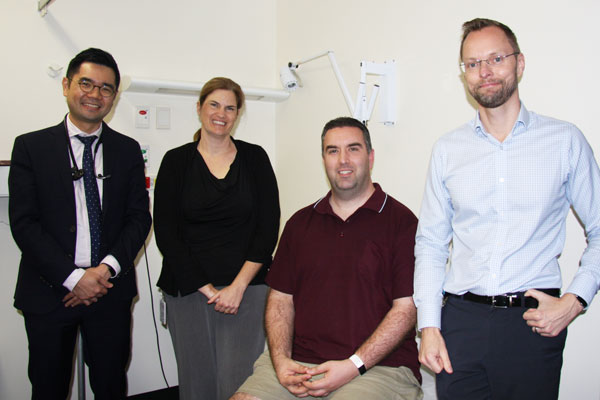New Cardiac Genomics service provides personalised medicine

Members of TPCH Cardiac Genomics team (l to r): Dr Yee Weng Wong (Cardiologist), Betsy Peach (Senior Genetic Counsellor), Michael Baldini (Cardiac Genomics Nurse Navigator) with patient, Tristan Clow.
The recent introduction of a cardiac genomics service at The Prince Charles Hospital (TPCH) is providing patients with greater access to personalised medicine through the early detection of inherited cardiac diseases.
Commencing in late 2020, TPCH’s cardiac genomics service allows clinicians to undertake day-to-day genomic testing of patients, as part of the standard suite of diagnostic tests for cardiac patients.
This involves careful genetic counselling followed by a simple blood test undertaken at the hospital, which can determine whether a patient has a pre-disposition in their genetic coding which may be causing their heart condition or abnormality, and could potentially affect family members.
Previously, genomic testing for all patients was undertaken by Genetic Health Queensland, a process that could take several months due to the high demand on the single central service and the requirement to involve an additional cardiac specialist.
Thanks to a funding grant from Genomics Queensland, TPCH, along with other Queensland hospitals – Princess Alexandra, Royal Brisbane and Women’s, and Cairns Hospitals can now undertake local testing, which allows faster diagnosis and better continuity of care.
The funding has supported the introduction of a dedicated cardiac genomics team including two genetic counsellors and a dedicated nurse navigator who work with hospital cardiologists to facilitate a comprehensive and coordinated assessment process.
TPCH cardiologist, Dr Yee Weng Wong said that having a local cardiac genomics service provided patients with more personalised medicine.
“It means we can quickly understand a patient’s individual genetic code and whether this is what is causing their cardiac condition or symptoms,” Dr Wong said.
“Importantly it means we can more effectively tailor treatment towards the patient’s specific clinical condition, and assist in the early detection of inherited cardiac conditions.
“Patients can have a greater peace of mind knowing that their family members can be made aware about any potential future health issues and do something about it if needed.”
Moving forward, the cardiac genomics service will focus on the four key areas of electrophysiology, cardiomyopathy, aortopathy and familial hyper-lipodaemia.
